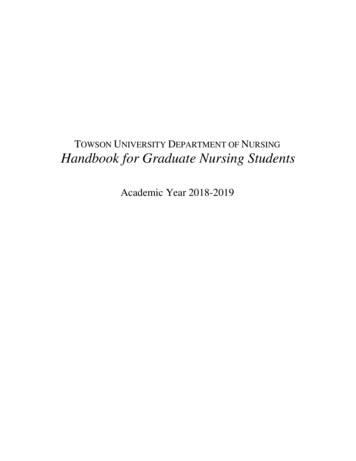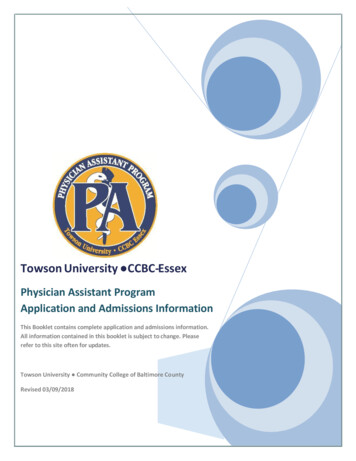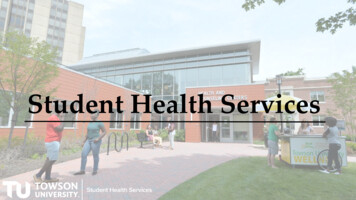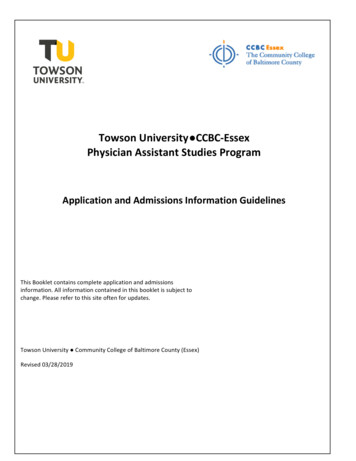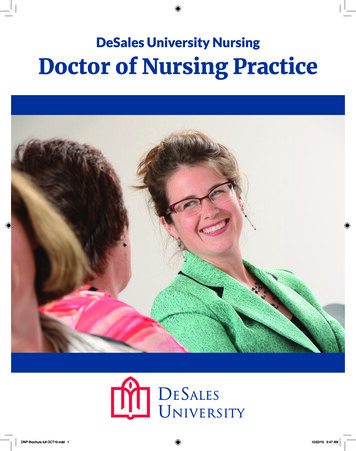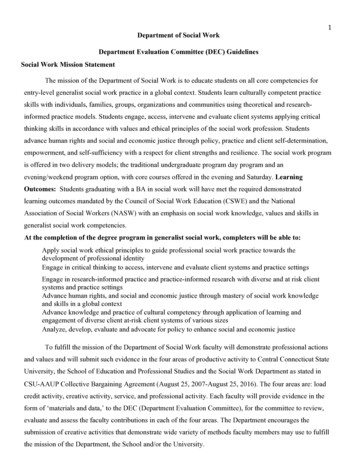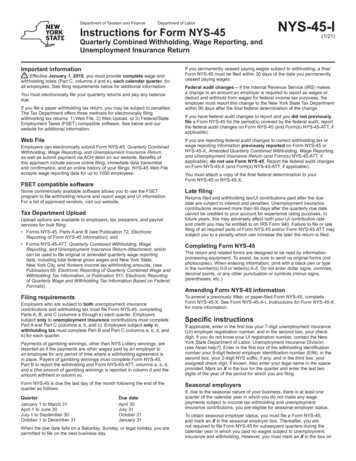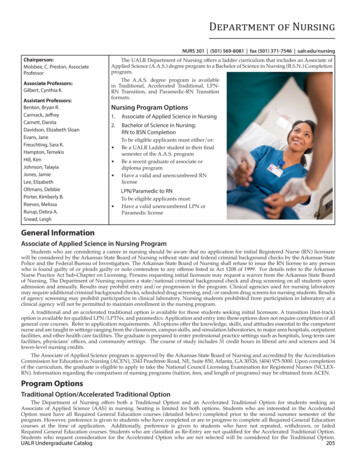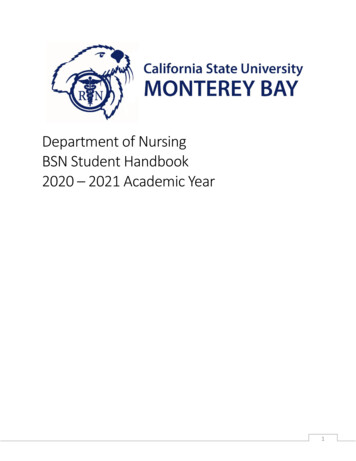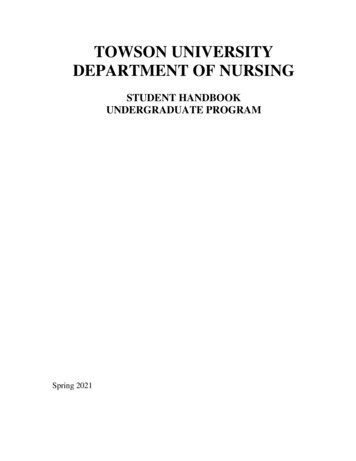
Transcription
TOWSON UNIVERSITYDEPARTMENT OF NURSINGSTUDENT HANDBOOKUNDERGRADUATE PROGRAMSpring 2021
Table of ContentsPrefaceINTRODUCTION .4MISSION STATEMENT .5PROGRAM OUTCOMES .6ESTIMATED FINANCIAL COSTS .7CURRICULUM .8CURRICULUM OUTLINE BASIC STUDENTS .9STUDENT CLINICAL REQUIREMENTS.10POLICY: STANDARDS AND FUNCTIONAL ABILITIES FOR NURSING STUDENTS .11PROGRAM REQUIREMENTS FOR CLINICAL PRACTICE .13HEALTH REQUIREMENTS .13CERTIFICATIONS, SCREENING AND OTHER DOCUMENTS .16COMPETENCIES .18MISCELLANEOUS REQUIREMENTS.19CLINICAL PLACEMENT REQUIREMENTS .21POLICIES AND PROCEDURES .22CODE OF CONDUCT .23FORMAL COMPLAINTS .23COPYRIGHT .23PROGRESSION AND ACADEMIC STANDING POLICIES .24PROGRESSION IN NURSING MAJOR .24SEMESTER REGISTRATION PROCESS .24ACADEMIC STANDING .24WITHDRAWAL POLICY .26GRADING POLICIES .26DEPARTMENTAL ACADEMIC GRADING .26INCOMPLETE GRADES .26GRADING CHART .27CHANGE OF SCHEDULE: COURSE DROP/ADD/FAILURE/WITHDRAW POLICIES .28DROPPING AND CLASS WITHDRAWAL .28PROCEDURE FOR REINSTATEMENT FOLLOWING DROPPED COURSES ORCOURSE WITHDRAWALS, FAILURES AND/OR UNSATISFACTORYCLINICAL GRADES .28LEAVE OF ABSENCE.29PROCEDURE FOR REINSTATEMENT FOLLOWING A LEAVE OF ABSENCE .29APPEAL PROCEDURES .30COURSE APPEALS .30DEPARTMENT OF NURSING RETURN REVIEW .30CLASS ATTENDANCE/ABSENCE .31EVALUATION OF STUDENT PERFORMANCE: CLASSROOM AND CLINICALPRACTICE .32DEPARTMENT CLINICAL POLICIES .33DOSAGE CALCULATION COMPETENCY TESTS .33CLINICAL PERFORMANCE AND PROFESSIONAL BEHAVIOR .33UNSAFE CLINICAL PERFORMANCE .33UNPROFESSIONAL BEHAVIOR .34CLINICAL ABSENCE .34INCLEMENT WEATHER GUIDELINES: CLINICAL PRACTICE.35
BLOOD BORNE PATHOGEN EXPOSURE PLAN .37GENERAL EXAM POLICIES .39KAPLAN INTEGRATED TESTING POLICY .40DEPARTMENTAL AND EXTERNAL RESOURCES .43HONORS AND SCHOLARSHIPS .44NURSING STUDENT ASSOCIATION .47CAMPUS-WIDE RESOURCES.48NURSING DEPARTMENT AWARDS .50GRADUATION . 51LICENSURE AS A REGISTERED NURSE. 51APPENDIX .52A. GENERAL INFORMATION .53B. NURSING FACULTY AND STAFF .54C. NATIONAL STUDENT NURSES' ASSOCIATION CODE OF CONDUCT .55
PrefaceThe Faculty, Students and Staff of the Department of Nursing welcome you as you embark upon the next steptoward the Bachelor of Science degree with a major in Nursing. We hope that your semesters in the Nursingmajor will be a challenging, as well as a rewarding time.This Handbook is the effort of many people. Its purpose is to delineate policies, procedures, and protocolsadopted by the Department. As in any undertaking of this magnitude, some things may not be as clear as youwould like or may raise other questions for you. There may be some additional information which you wouldlike to see included. We welcome your comments and suggestions.It is your responsibility to abide by the policies and procedures established by the Department of Nursing. TheDepartment of Nursing may amend the information contained in this handbook by modifications, deletions, oradditions to it. The handbook and the information it contains do not constitute a contract. If you have furtherquestions, please feel free to contact a Faculty Advisor or the Admissions and Continuance Committee. Studentswill be notified of changes to policies and procedures via an email sent through the Nursing Student CommunityBlackboard site.Students are expected to familiarize themselves with the Undergraduate Catalog and to satisfy all publisheddegree requirements for each major and minor being completed. Failure to do so does not provide a basis forexceptions to academic requirements or policies. It expected that students will receive assistance from generalacademic and faculty advisors, but students must assume responsibility for completing published degreerequirements by reviewing their “academic requirements” transcript often.With input and approval from the Department of Nursing Faculty Organization, components of the StudentHandbook have been reviewed and revised by members of the Admissions and Continuance Committee for thespring 2021 semester.
INTRODUCTION
MISSION STATEMENTThe mission of Towson University’s Department of Nursing is to provide exceptional graduate andundergraduate education in a student-centered, caring environment to meet the diverse health needs of allpopulations. Graduates are prepared to practice in a rapidly changing health care environment usingcompassion, ethics, evidence-based care and inter-professional collaboration. Faculty promote integration ofprofessional values and a commitment to lifelong learning.Rev. 11.16
PROGRAM OUTCOMESProgram OutcomesUpon completion of the Nursing major, the graduate will:1. Demonstrate knowledge and skills necessary to provide and manage effective patient-centered nursingcare of the individual, community, or population as a member of the inter-professional team.2. Incorporate psychosocial-cultural knowledge and sensitivity in the care of the individual, community, orpopulation.3. Promote a culture of caring in diverse settings for the individual, community, or population.4. Participate in quality improvement and patient safety initiatives in a variety of health care settings.5. Assist all clients who are experiencing stress to move towards adaptation through the use of evidencebased nursing practice.6. Use and manage information and clinical technology to deliver effective and efficient patient-centeredcare.7. Evaluate the impact of socio-economic, ethical, legal and political factors on health care delivery andprofessional nursing practice as it relates to the individual, family, community or population.8. Use communication, leadership and collaborative skills in the delivery of high-quality, patient-centeredcare for the individual, family, community or population.9. Demonstrate clinical reasoning, management and evaluation skills in the development and delivery ofpatient-centered care for multiple clients with complex needs.10. Implement holistic, patient-centered care across the life span that reflects an understanding of thesciences, nursing and the humanities.11. Integrate profession values and a commitment to lifelong learning into one’s professional practice.
ESTIMATED FINANCIAL COSTSThese estimates are provided for you to have an idea of the additional amounts of money you will need tobudget for your nursing education. Remember, these are only estimated costs. The Department of Nursing hasno control over University fees and/or additional fees charged by other companies. University tuition and feeinformation can be found on the following web address: htmlDESCRIPTIONNursing TextbooksFEES 1000Parking (on-campus) 303CPR Certification 80Nursing Skills Bag 90Uniform 150Equipment 150Health & Accident InsuranceVaries by providerPhysical Examination andImmunizationVaries by providerStudent Nurse Professional LiabilityInsuranceVaries by providerEducation Testing 150/semesterSimulation Learning FeeApproximately 250Criminal Background Check, UrineDrug Screen and Document TrackerApproximately 100 125COMMENTSApproximate cost for first semester of theProgramHagerstown student costs may varyDoes not include costs (if any) for off-siteclinical placement parking fees.Approximate cost – vary bylocation/vendorApproximate cost - Contains suppliesneeded for skills practiceApproximate costApproximate cost - Stethoscope,sphygmomanometer and watch withsecond-hand requiredRequired. Students may purchase throughthe Health CenterMay be completed at the Health CenterOptions to consider (others available) Nurses Service Organization(NSO) CM&F Group, Inc.Each semester, at the time of registrationfor the clinical course, a testing fee will beassessed through the Bursar’s office. If anyclinical courses are repeated, the studentwill be charged an additional 150.Due at time of registration for NURS 356– Foundations. Fee assessed throughBursar’s office.Assessment through CastleBranch
CURRICULUM
CURRICULUM OUTLINEFOUR-YEAR PLAN OF STUDYB.S. DEGREE WITH A MAJOR IN NURSING--BASIC STUDENTSFreshman Term 1ENGL 102 Writing for Liberal Education ORTSEM Towson Seminar3BIOL 191/191L Intro Biol for the Health Prof lecture and lab 4MATH 115 College Algebra3PSYC 101 Introduction to Psychology ORSOCI 101 Introduction to Sociology3Core Requirement3Units16Freshman Term 2TSEM Towson Seminar ORENGL 102 Writing for Liberal EducationCHEM 121/121L Allied Health Chemistry I lecture and labSOCI 101 Introduction to Sociology ORPSYC 101 Introduction to PsychologyCore RequirementCore RequirementSophomore Term 1BIOL 221/221L Human Anatomy and Physiology I lectureand labPSYC 203 Human DevelopmentMATH 231 Basic Statistics or Math 237 BiostatisticsCore RequirementCore RequirementSophomore Term 2BIOL 222/222L Human Anatomy and Physiology II lectureand labBIOL 215 Essentials of MicrobiologyHealth 331 Nutrition for the Health ProfessionalsCore 4Admission to the nursing major is required before enrollment in these courses, with the exception of NURS416, which may be taken before admission.Junior Term 1NURS 332 Professional Nursing I: Introduction to Nursing 3NURS 340 Pathopharmacology5NURS 347 Health Assessment Across the Lifespan3NURS 356 Nursing & Healthcare I: Foundations3NURS 356C Nursing & Healthcare I: Foundations Clinical 2Units16Senior Term 1NURS 435 Professional Nursing III: Research in Nursing* 3NURS 472 Nursing & Healthcare V: Family Health3NURS 472C Nursing & Healthcare V: Family Health Clinical 2NURS 474 Nursing & Healthcare VI: Child Health3NURS 474C Nursing & Healthcare VI: Child Health Clinical 2NURS 480 Nursing & Healthcare VII: Adult Health & ComplexIllness3Units16Junior Term 2NURS 333 Professional Nursing II: Issues (Core 9)3NURS 358 Nursing & Healthcare III: Mental Health3NURS 358C Nursing & Healthcare III: Mental Health Clinical 2NURS 360 Nursing & Healthcare II: Adult Health and Illness 3NURS 360C Nursing & Healthcare II: Adult Healthand Illness Clinical2NURS 416 Cultural Diversity in Healthcare (Core 13)3Units16Senior Term 2NURS 460 Nursing & Healthcare IV: Older Adult2NURS 476 Nursing & Healthcare VIII: Community Health3NURS 476C Nursing & Healthcare VIII: CommunityHealth Clinical2NURS 484 Nursing Leadership and Management3NURS 485 Clinical Practicum3*Statistics must be completed prior to taking NURS 435: Professional Nursing III: Research in Nursing.Units13
STUDENT CLINICAL REQUIREMENTS
POLICY: STANDARDS AND FUNCTIONAL ABILITIES FOR NURSING STUDENTSThe Towson University, Department of Nursing undergraduate education major is a rigorous and intense programthat will require both mental and physical functional ability as the student accepts responsibility andaccountability for the care of clients in a variety of health care settings. The nursing major prepares graduates tofunction as clinicians at the bedside and in beginning leadership roles. It also provides the foundation for graduateeducation. The functional standards set forth are the essential standards considered necessary for the student toattain the knowledge, skills and competencies necessary for the entry level nurse.The National Council of State Boards of Nursing has identified functional abilities required for nursing studentsand professionals. The Department of Nursing has adopted these basic standards as requirements for all nursingstudents. Students admitted into the nursing major must be able to meet the expectations of the program andclinical sites. Students are required to perform activities with or without reasonable accommodations in theclassroom, lab and clinical settings. In order to be considered for accommodation the student must submitappropriate documentation of his or her disability to the office of Disability Support Services at TowsonUniversity. Disability Support Services will engage in an interactive process with the student and the Departmentof Nursing and College of Health Professions to determine eligibility and reasonable accommodations, asappropriate.The following standards and functional abilities are expectations of the nursing major, not requirements foradmission into the nursing program. Individuals applying for admission to the nursing program should reviewthese functional standards to better understand how they may address any disability or limitation throughreasonable accommodation. It is recommended that students consult with Disability Support Services as theyconsider what reasonable accommodation may be appropriate to mitigate the impact of a disability (e.g., amplifiedstethoscope, writing aids/software, stand-up wheelchair).Critical lity sufficient for clinicaljudgmentAbility to comprehend Englishlanguage via written word andcomputerized English languageskillsAbility to perform mathematicalcomputations in order to safelycalculate and convert medicationdosages, weight and other forms ofmeasurementsAbility to clearly receive andinterpret soundsAbility to clearly visualize theclient, equipment and environmentFunctional AbilitiesIdentify cause and effectrelationships;Problem solvePredict/evaluate outcomesSequence informationRead documents including but notlimited to: protocols, policies,graphs, computer screens andbedside monitorsAdd, subtract, multiply, dividewhole numbers; compute fractionsand decimals. Measure time,calculate medication dosage, countratesAuscultate and interpret soundfrom within the organ systems ofthe body. Physically respond tovoices, alarms and emergencysignalsObserve and inspect client visibleappearance. Observe clientresponse or condition. Distinguishcolor and intensity. Preparemedications, visualize measuringincrements, read monitors andcomputer screens
SmellPhysical strength/enduranceStandardsAbility sufficient to detectenvironmental odorsAbility to perform full range ofpatient care activitiesMotor SkillsAbility to provide safe andeffective nursing careMobilityAbility sufficient to move withinconfined spaceTactileAbility to touch and feelCommunicationAbility for interaction with othersusing verbal, written andcomputerized English languageskillsInterpersonal SkillsAbility to appropriately interactwith others in a respectful mannerFunctional AbilitiesDetect foul smelling odors; detectsmoke/gasesPerform nursing duties for longperiods of time at client bedside;push/pull/support light and heavyobjects; carry equipment; supportclients in ambulation, positioningand standing.Position clients; obtain specimens;calibrate instruments andequipment. Prepare and administermedications. Reach, bend andgrasp with ease; fine motor skillsMove adequately in confinedpatient care areas; move quickly,grasp with ease, administerrepetitive movements (CPR)Pe
The Towson University, Department of Nursing undergraduate education major is a rigorous and intense program that will require both mental and physical functional ability as
